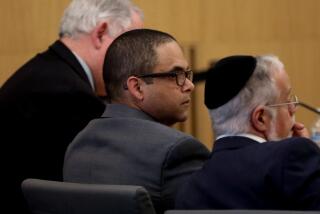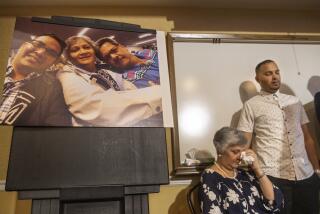Jury reports it’s deadlocked in the fatal police shooting of Walter Scott in South Carolina
Reporting from Atlanta — The jury in the murder trial of Michael Slager, a white former North Charleston police officer who fatally shot an unarmed black man, Walter Scott, informed a judge Friday it was unable to reach a unanimous decision.
One juror is refusing to consider a conviction, according to the jury foreman.
After deliberating for more than two days, the jury of 11 whites and one African American cannot seem to agree on any of its three options: convicting Slager of murder, convicting him of voluntary manslaughter, or acquitting him.
“I cannot in good conscience consider a guilty verdict,” the dissenting juror wrote in a letter that Circuit Court Judge Clifton Newman read out in court.
“We all struggle with the death of a man and with all that has been put before us,” the juror wrote. “I still cannot, without a reasonable doubt, convict the defendant. At the same time, my heart does not want to have to tell the Scott family that the man who killed their son, brother and father is innocent. But with the choices, I cannot and will not change my mind.”
In separate notes, the jury foreman wrote to the judge: “It’s just one juror that has the issues” and “that juror needs to leave.”
The jurors’ inability to reach consensus, in a case that presented video evidence of Slager shooting Scott in the back, points to the immense challenge of convicting law enforcement officers amid a charged national debate on police violence.
The April 2015 shooting was one of a string of fateful police interactions with African Americans that inspired street protests and national criticism of officers’ use of force against black people. Scott’s death incited particular outrage after a bystander released a cellphone video showing Slager, 35, firing at Scott as he fled from a traffic stop.
Early Friday afternoon, when the jury indicated it was struggling to reach agreement, Judge Newman urged jurors to return to their deliberations and “reexamine the questions before you based on the law and the evidence in this case.”
“It isn’t always easy for even two people to agree, so when 12 people must agree, it becomes even more difficult,” he said. “You have a duty to make every reasonable effort to reach a unanimous verdict. Discuss your differences with an open mind.”
A few hours later, the jurors reported that they remained deadlocked. The foreman told the court he believed an explanation of the law would help them reach consensus. A defense attorney asked the judge to call a mistrial, a motion that prosecutors opposed.
Court recessed Friday without a final decision after jurors reported they were “beat” and wanted to continue deliberations Monday morning.
“I can understand if you’re beat,” Newman told the jury. “I think we’re all beat.”
If the jury fails to reach agreement, forcing the judge to declare a mistrial, it will be the second time a jury has deadlocked over a police shooting in less than a month. On Nov. 12, a judge in Ohio declared a mistrial after a jury failed to agree on the case of a white former University of Cincinnati police officer, Ray Tensing, charged with murder in the fatal shooting of an unarmed black motorist, Samuel DuBose.
During the monthlong South Carolina trial, prosecutors argued that Slager fired eight shots at Scott out of malice, ill will and total disregard for human life. Slager’s legal team countered that Slager shot Scott in self-defense.
While the grainy eyewitness video captures the shooting, it does not show the moments leading up to the incident. On Tuesday, Slager testified that he pulled Scott over for a broken taillight and went back to his police cruiser to write up a warning ticket. Suddenly, Scott ran from his vehicle, Slager pursued, and the two men became embroiled in a physical altercation. Slager said he was left in “total fear” after Scott grabbed his Taser and pointed it at him.
Before the jury announced it was unable to reach a decision, there were signs that it was struggling over the lesser charge of voluntary manslaughter. On Thursday, after nine hours of deliberating, jurors asked the judge to explain the difference between fear and passion. While Slager’s defense hinged on his fear for his life when he fired at Scott, the manslaughter charge involves killing in the heat of passion.
On Friday, the jury asked for the testimony of Feidin Santana, the bystander who recorded the cellphone video. Then, minutes after that request, the jury sent another note to the judge: “It is clear that jurors will not be able to come to consensus,” it said.
Community activists were stunned. Many have long drawn attention to practices by officers from the North Charleston Police Department, arguing there is a history of police profiling and excessive force against African Americans.
“You tell me that you can clearly see a man being executed on video and you cannot come up with a verdict?” said Charles Tyler, president of the Charleston chapter of the National Action Network. “That sends a strong message to people of color. The message it tells police officers is you can execute a person of color and get away with it.”
“Something is wrong with the system,” he added. “Clearly, the country is divided.”
News of the jury’s failure to reach a verdict came just a few days after a prosecutor in Charlotte, N.C., announced no charges would be filed against a police officer in the September shooting of Keith Scott, an African American man whose death inspired violent protests in North Carolina. He was not related to Walter Scott.
In that case, prosecutors said Keith Scott had a gun in his hands, and that the police officer, Brentley Vinson, was justified in shooting Scott when he refused to heed commands to drop it.
In the Ohio case that resulted in a hung jury last month, the officer testified that he feared for his life when DuBose tried to drive away. His attorney argued that DuBose tried to use his car as a deadly weapon, yet prosecutors said body-camera evidence contradicted the officer’s story, showing Tensing fired before the car started moving.
South Carolina officer shoots fleeing black man
Jarvie is a special correspondent.
ALSO
Q&A: What we know about ambush cop killings
Opinion: Does running from police justify execution?
As police shootings continue, bystanders get more sophisticated at filming altercations
More to Read
Sign up for Essential California
The most important California stories and recommendations in your inbox every morning.
You may occasionally receive promotional content from the Los Angeles Times.











